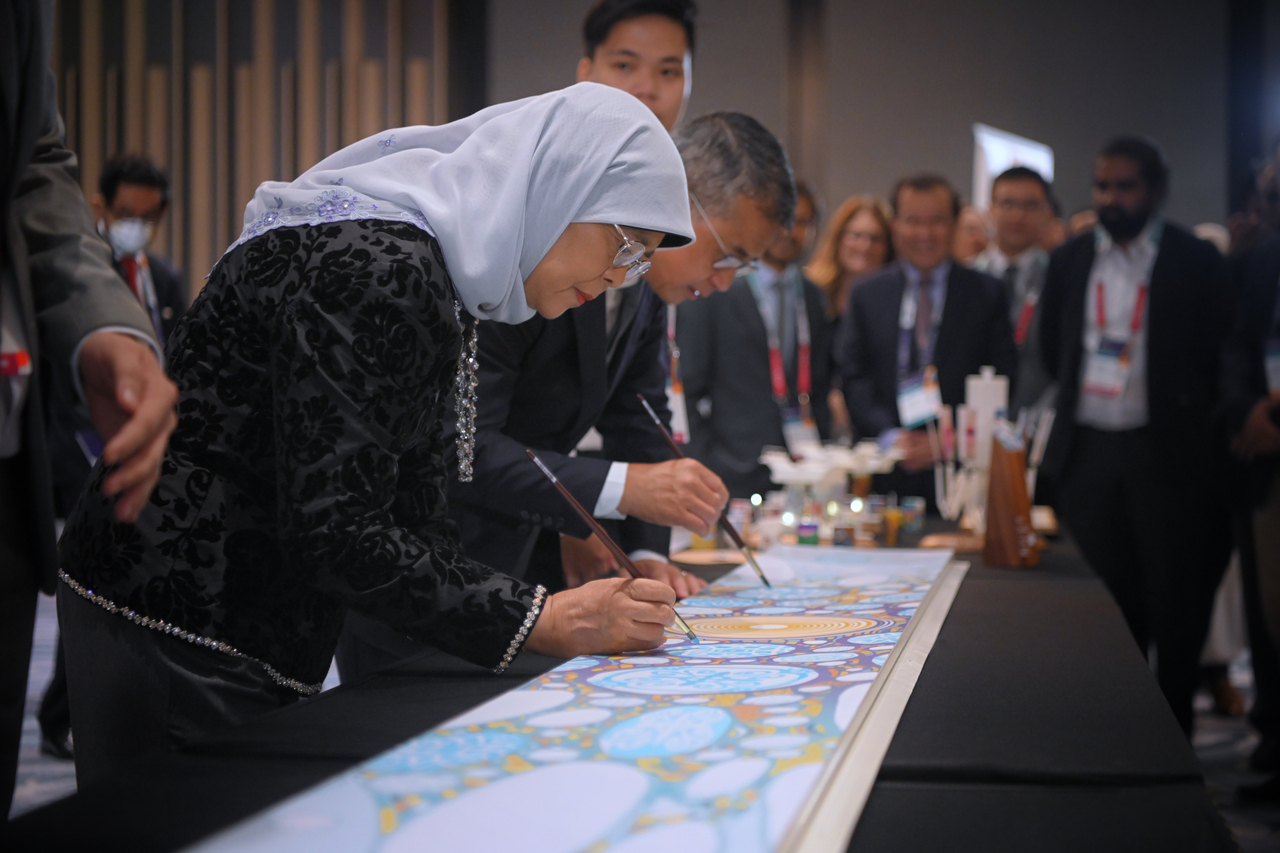Covid-19 showed that cohesive societies are born of choice and conviction: President Halimah
Sign up now: Get ST's newsletters delivered to your inbox

President Halimah Yacob and Minister Edwin Tong applying the finishing touches of paint to a panel intended for sprucing up an MRT track pillar on Sept 6, 2022.
ST PHOTO: MARK CHEONG
Follow topic:
SINGAPORE - Cohesive societies do not exist spontaneously. They are born of choice and conviction, and the Covid-19 pandemic has reinforced this, said President Halimah Yacob on Tuesday.
Speaking at the opening of a three-day conference to discuss issues surrounding faith, identity and cohesion, she noted that public health measures that were needed to curb the coronavirus heightened social anxiety.
Tensions rose and, in some cases, triggered bigotry and xenophobia, she said.
Some places saw hate crimes against Asians, who were blamed for the spread of the virus. Meanwhile, measures like vaccinations became points of contention.
"The pandemic deepened fault lines in societies across the world, when what was urgently needed to recover from the pandemic were collective action and cooperation," she said.
"Social cohesion is a necessary condition for our collective security. Societies cannot survive, let alone thrive, without the social glue that bonds people together."
Over 800 participants from more than 40 countries are attending the International Conference on Cohesive Societies at the Raffles City Convention Centre. The event is organised by the S. Rajaratnam School of International Studies (RSIS) and Nanyang Technological University, and supported by the Ministry of Culture, Community and Youth (MCCY).
The conference, which was mooted by Madam Halimah and held for the first time in 2019, is an international platform for participants to engage in dialogue and action on how they can foster harmony in diverse societies.
Themed "Confident Identities, Connected Communities", this year's event brings together religious leaders, policymakers, academics and civil society activists. More than 40 per cent of the participants are under the age of 40.
While the 2019 event discussed how groups can find common ground with one another, this year's event aims to explore the role of identities, beliefs and faiths in shaping social connections and cohesion.
Madam Halimah hoped that the conference provides a platform for people to learn from one another and be comfortable with differences.
She posed the audience two questions: Moving forward, how do we safeguard and promote social cohesion amid these challenging times? How do we bridge divides and harness our diversity for the common good?
She also shared a quote she came across two months ago when Singapore celebrated its annual Racial Harmony Day: "Racial harmony means we can all be friends because we are all human beings."
It came from Gaia Amedi, a four-year-old pre-schooler.
"It is a moving reminder that despite all our differences and disagreements, we are human beings at the end of the day, equally fragile, yet equally resilient," said Madam Halimah.
"We may come from different backgrounds, countries, cultures and religions, but we share the same core values of kindness, compassion and love."
Madam Halimah also highlighted the South-east Asian Social Cohesion Radar study by RSIS, which found that 69 per cent of those surveyed in the region believed that their country is socially cohesive.
According to the study, the level of trust and acceptance between each other, and the social networks that people build over time are elements that help strengthen social cohesion.
In view of the findings, initiatives like the Commitment to Safeguard Religious Harmony launched at the last conference in 2019 have become even more pertinent, she said. More than 750 of Singapore's religious organisations have pledged to strengthen bonds across communities through interactions like attending one another's festivals.
This week, conference participants can join visits to community spaces and places of worship around Singapore to meet local community and religious leaders.
A Young Leaders Programme will also take place for the second time, and has gathered 120 youth leaders to drive social cohesion initiatives.
Two of its alumni are Mr Basil Kannangara and Mr Nicholas Pang, both from Singapore, who developed a card game called Diversity by Default, featuring questions relating to race, religion, nationality and disability to spark conversations and dispel misperceptions on these issues.
They will mentor this year's young leaders, who can pitch their proposals to a judging panel on Thursday. MCCY will provide funding to develop selected projects.
"We face common challenges globally as we emerge from the pandemic," said Madam Halimah.
"We must continue to create and build safe and open platforms to discuss sensitive issues and work together to strengthen unity and resilience in our societies."

